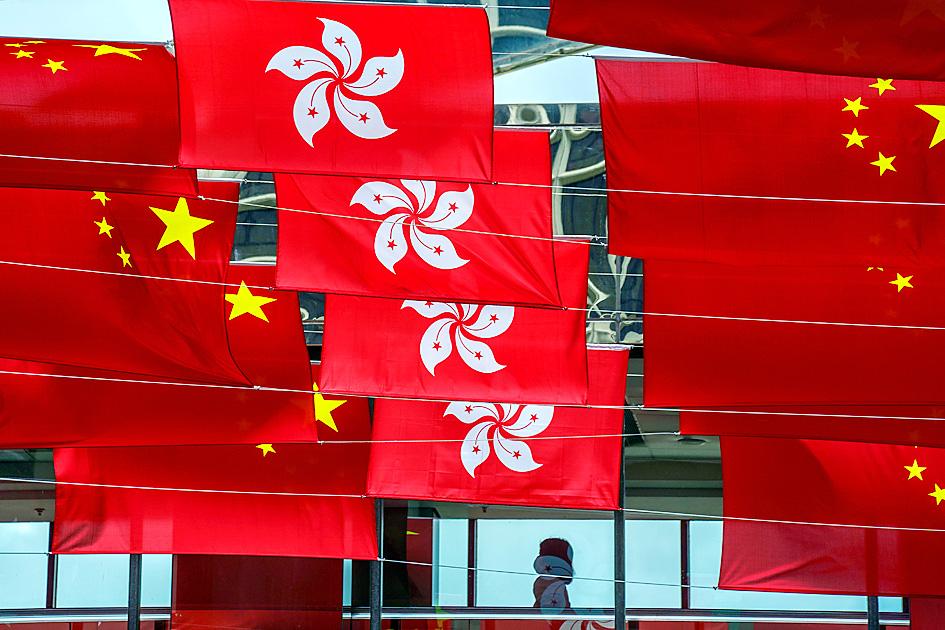Beijing appears to be using Hong Kong’s National Security Law to target “foreign forces,” and is continuing to change the territory’s governance and institutions to reflect those of mainland China, the Mainland Affairs Council’s (MAC) latest quarterly report said.
China is continuing to undermine Hong Kong’s autonomy and is beginning to target foreign organizations that operate in the territory, using the law Beijing imposed on Hong Kong nearly two years ago, the report said.
Citing an example, the report said that British nonprofit Hong Kong Watch was on March 4 approached by officials from Hong Kong’s National Security Department to remove content from its Web site that the department said contravened the national security legislation.

Photo: Bloomberg
It was the first report of a foreign organization targeted with the law, the report said.
Suppression of individual rights and freedoms accelerated in January with the first convictions in Hong Kong for publications contravening the law, it said.
In March, former Hong Kong Bar Association chairman Paul Harris left the territory after security officials warned him that he was allegedly in contravention of the law, the report said.
Although Hong Kong participates in international organizations separate from China, it supports the Chinese Communist Party’s (CCP) political goals, such as blocking Taiwan’s “meaningful participation in the WTO,” it said.
By demonstrating its need to act on behalf of the CCP, Hong Kong is showing that its ability to meaningfully participate independently in international organizations is weakening, it added.
The report also cited Hong Kong government data as showing that the number of mainland Chinese and foreign companies registered in the territory is increasing, despite overseas companies leaving — indicating that Chinese investment in Hong Kong is growing.
Last year, 9,049 foreign and Chinese companies were registered in Hong Kong, compared with 9,025 companies the previous year.

DAREDEVIL: Honnold said it had always been a dream of his to climb Taipei 101, while a Netflix producer said the skyscraper was ‘a real icon of this country’ US climber Alex Honnold yesterday took on Taiwan’s tallest building, becoming the first person to scale Taipei 101 without a rope, harness or safety net. Hundreds of spectators gathered at the base of the 101-story skyscraper to watch Honnold, 40, embark on his daredevil feat, which was also broadcast live on Netflix. Dressed in a red T-shirt and yellow custom-made climbing shoes, Honnold swiftly moved up the southeast face of the glass and steel building. At one point, he stepped onto a platform midway up to wave down at fans and onlookers who were taking photos. People watching from inside

A Vietnamese migrant worker yesterday won NT$12 million (US$379,627) on a Lunar New Year scratch card in Kaohsiung as part of Taiwan Lottery Co’s (台灣彩券) “NT$12 Million Grand Fortune” (1200萬大吉利) game. The man was the first top-prize winner of the new game launched on Jan. 6 to mark the Lunar New Year. Three Vietnamese migrant workers visited a Taiwan Lottery shop on Xinyue Street in Kaohsiung’s Gangshan District (崗山), a store representative said. The player bought multiple tickets and, after winning nothing, held the final lottery ticket in one hand and rubbed the store’s statue of the Maitreya Buddha’s belly with the other,

Japan’s strategic alliance with the US would collapse if Tokyo were to turn away from a conflict in Taiwan, Japanese Prime Minister Sanae Takaichi said yesterday, but distanced herself from previous comments that suggested a possible military response in such an event. Takaichi expressed her latest views on a nationally broadcast TV program late on Monday, where an opposition party leader criticized her for igniting tensions with China with the earlier remarks. Ties between Japan and China have sunk to the worst level in years after Takaichi said in November that a hypothetical Chinese attack on Taiwan could bring about a Japanese

‘COMMITTED TO DETERRENCE’: Washington would stand by its allies, but it can only help as much as countries help themselves, Raymond Greene said The US is committed to deterrence in the first island chain, but it should not bear the burden alone, as “freedom is not free,” American Institute in Taiwan Director Raymond Greene said in a speech at the Institute for National Defense and Security Research’s “Strengthening Resilience: Defense as the Engine of Development” seminar in Taipei yesterday. In the speech, titled “Investing Together and a Secure and Prosperous Future,” Greene highlighted the contributions of US President Donald Trump’s administration to Taiwan’s defense efforts, including the establishment of supply chains for drones and autonomous systems, offers of security assistance and the expansion of